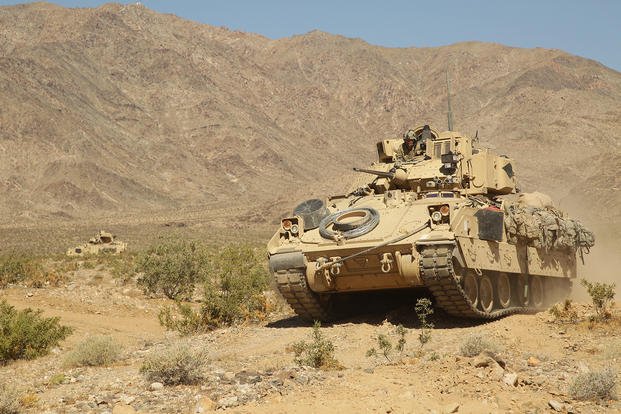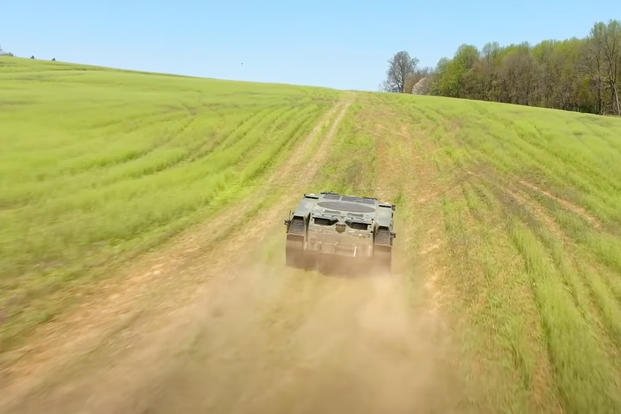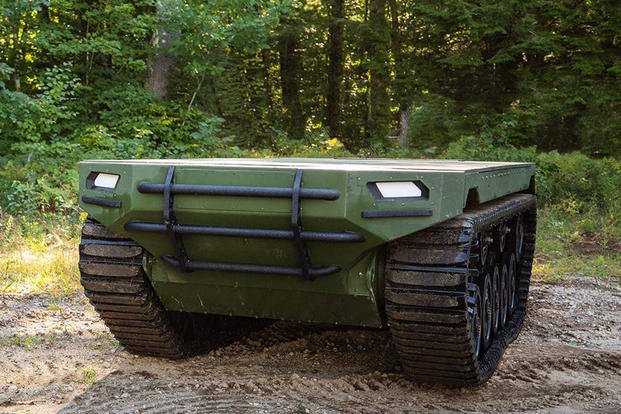Editor’s note: This is the third in a four-part series on the Army’s Robotic Combat Vehicle program.
The Ripsaw M3 shattered minds and ignited imaginations when it blasted onto the screen in 2017’s “The Fate of the Furious.” Besides wanting to own one, most of us saw massive potential for the vehicle to make an impact in the U.S. military. You could even say that not buying a fleet of Ripsaws for American service members would be tantamount to screwing around.
Apparently, decision-makers at the highest levels of the Defense Department weren’t just paying attention to “The Fate of the Furious,” but thinking several steps ahead. The Ripsaw is in contention for a very juicy military contract as we speak — but not in the form you might expect.
Robotic Combat Vehicles Are the Future
As cool as the original Howe & Howe Ripsaw is, there’s one critical vulnerability: the driver. Eliminate the risk of human casualties, and the vehicle looks like something out of the “Terminator” franchise rather than a car flick.
Killer robot tanks might sound like science fiction, but the Army is very serious about developing a Robotic Combat Vehicle (RCV). According to a 2023 Army release, the service has narrowed the search down to prototypes from four companies: General Dynamics Land Systems, McQ, Textron Systems and Oshkosh Defense.
The goal for this program, according to a report from the Congressional Research Service, is to build an unmanned vehicle that’s small enough to be transported by helicopter and powerful enough to bear anti-tank guided missiles.

In the future, RCVs will be able to probe enemy defenses, foil ambushes and survey unfamiliar terrain with advanced weapons and surveillance systems instead of human lives. The RCV program is searching for RCVs that could one day take on missions currently carried out by everything from dismounted infantry to the Bradley Fighting Vehicle.
The Ripsaw M3 Is a New Kind of Fighting Vehicle

To make the combat Ripsaw a reality, Howe & Howe joined a dream team of defense industry all-stars. Textron Systems might be the trio’s MVP. This is the company that supplies the military with Aerosonde unmanned aerial vehicles and a dizzying array of advanced electronic systems.
Speaking of digital wizardry, the team also includes Teledyne FLIR. Given the company’s existing arsenal of land systems available to the U.S. military, it’s safe to say that any enemy will have a tough time hiding from the Ripsaw if it ends up on the battlefield.
“Team RIPSAW combines the specialties of Textron Systems, Howe & Howe and Teledyne FLIR Defense, creating a mission-ready system to support the Army’s needs,” David Phillips, Textron’s senior vice president of land systems and sea systems, said. “Building on our proven cross-domain capabilities and experience, the vehicle has evolved and adapted based on customer feedback, leading us to the RIPSAW M3 of today.”
Want hard numbers? According to the spec sheet, the Ripsaw M3 has a gross weight (which includes the vehicle and its maximum payload) of 16,000 pounds. It can reach a top speed of 30 mph, climb 60-degree slopes and conquer 24-inch vertical obstacles. Its onboard batteries can provide 12 hours of silent watch.
If the idea of watching Ripsaws cut up the battlefield of tomorrow is enough to make your head spin, I get it. But Textron Systems boils it down to five key capabilities.
Like previous Ripsaw RCV prototypes, the M3 has a flat deck and enough electric power to run a wide range of offensive, defensive and surveillance systems. Its modular design allows forward units to tailor configurations to the mission at hand rather than fielding multiple vehicles.
The integration of autonomous software allows the Ripsaw M3 to do its thing without putting soldiers in harm’s way — or even asking them to micromanage its every move.
Despite all these capabilities, the Ripsaw M3 is tiny compared to comparable manned vehicles. It can fit inside a CH-47, making it rapidly deployable just about anywhere it’s needed.
It’s strong, too. The compact Ripsaw M3 has a payload of 5,000 pounds. Commanders can add weapon systems, supplies or even casualties in need of evacuation.
Keep in mind that this isn’t a modified version of the Ripsaw that debuted several years ago. It was designed from the ground up to be an autonomous vehicle, so all these capabilities come in a compact, harmonious package that Textron Systems has been refining for several iterations.
Oh, and the Ripsaw M3 can swim. I feel as though that should have made the company’s top-five list. Textron Systems carried over amphibious technology from its Cottonmouth Advanced Reconnaissance Vehicle program, so not even lakes and rivers can stop the new RCV.
Superstar Actor/Rapper Not Included
I would love to see Ludacris take out America’s enemies while dropping pithy one-liners. I’m sure you would, too. But luckily for him (and our soldiers), the U.S. Army is leaning into remote operation and autonomous technology.
In the same way that the military can put eyes in the sky and warheads on foreheads without putting a pilot in the cockpit, crewless vehicles are going to change the way America fights its battles.

In an age where cheap consumer-grade drones deliver pinpoint strikes and improvised explosive devices can shred even the most heavily armored vehicles, it’s becoming increasingly important to fight inanimate threats with inanimate assets.
There will always be a need for humans in the battlespace, but for the service members who put their lives on the line, every person we can keep at arm’s distance is a step in the right direction.
What’s Next for the Ripsaw M3?

According to a report from the Congressional Research Service, the Army had scheduled testing for the four RCV contenders to take place during the summer of 2024. The planned evaluation includes force-on-force training with active-duty units out of Fort Stewart, Georgia, and Fort Riley, Kansas. The service officially took receipt of two prototypes in early October.
If the Ripsaw M3 beats out the competition, it will be some time before the vehicle is ready for combat. The Army hopes to select a winner and field operational units in 2028. We’ll have to be patient while we wait for a mission-ready RCV, but at least we should know what it will look like very soon.
Want to Know More About the Military?
Be sure to get the latest news about the U.S. military, as well as critical info about how to join and all the benefits of service. Subscribe to Military.com and receive customized updates delivered straight to your inbox.
Story Continues
Read the full article here

